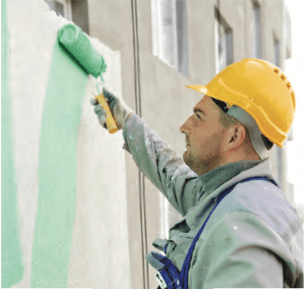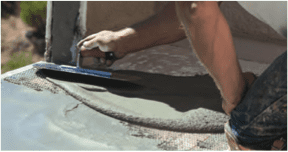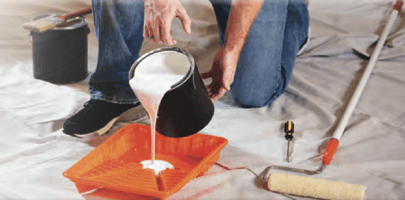Keeping It Clean

Best Practices for Painters, Remodelers and Concrete Workers
Best management practices, or BMPs, are procedures that should be used to prevent pollutants — such as paints, solvents, mortar and other harsh chemicals — and their contaminated wash water from entering our storm drains and polluting our waterways.
- Do not operate small mixers in the road right-of-way. Set up small mixers on tarps or heavy plastic drop cloths. Contain contaminated water on-site.
- Never dispose of masonry washout into the street, storm drain or drainage ditches. Empty mixing containers and wash out chutes onto a designated concrete washout area.
- Sweep up and dispose of small amounts of excess dry concrete, grout and mortar in the trash.
- Do not place fill materials, soil or compost piles on the sidewalk or street.
- Always store both dry and wet materials under cover, protected from wind, rainfall and runoff, and away from storm drains and waterways.
- Wash concrete and/or brick areas only when wash water can flow onto pervious areas. Drain wash water onto a surface which has been bermed so that materials can dry and be reused, recycled or placed in the trash.
- Ensure your on-site dumpster is covered at all times.
- Schedule grading and excavation projects for dry weather. Cover excavated material and stockpiles of asphalt, sand, etc. with plastic tarps to protect from wind and rainfall.
- Prevent erosion by temporarily or permanently stabilizing loose soil.

Who Can You Contact?
To report illegal dumping or for more information, call (727) 464-4425, Monday to Friday from 8 a.m. to 5 p.m. For questions on waste disposal, contact Pinellas County Solid Waste at (727) 464-7500. For 24-hour voicemail (non-emergency spills only), call (727) 464-5060.
Working With Paint Products

- Keep all liquid paint products away from the street, gutter and storm drains. Liquid residues from thinners, solvents, flues and cleaning fluids are hazardous waste. When thoroughly dry, used brushes, rags, drop cloths and empty paint cans (lids off) may be disposed as trash.
- Never put flammable products such as oil-based paint or thinner down any drain or into the garbage!
- Never clean brushes or rinse paint containers into a street, gutter or storm drain. For oil-based paints, get paint out of brushes as much as possible, then rinse in the sink or onto a heavy plastic drop cloth. Let dry and then dispose in the trash.
- Chemical paint stripping residue, including saturated rags, are hazardous waste.
- Chips and dust from paints containing lead or tributyltin are hazardous waste.
- When stripping or cleaning building exteriors with high-pressure water, use sandbags or berms, or seal the stormdrain with plugs or rubber mats.
Pinellas County Stormwater Regulations
Pinellas County’s stormwater ordinance, Article VI, Chapter 58, is intended to protect the water quality and natural habitat of creeks, lakes and marine waters that receive discharges from our drainage system. The ordinance states
that any discharge to the drainage system or to a waterway that is not composed entirely of stormwater is prohibited.
This means that pollutants of any kind, including contaminated wash water and construction materials, may not enter the street, storm drain or gutter. Violators of the stormwater ordinance may be fined up to $10,000 per day, and payment for cleanup costs may be required.
More Information
For more information on what you can do to keep our waterways clean and our watersheds healthy, or to report pollution, call the Watershed Management Hotline at (727) 464-4425 or email us at watershed@pinellas.gov.